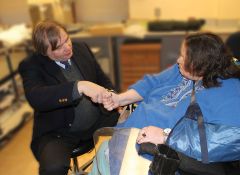February 01, 2024
Jefferson Health System and Inglis – A Partnership in MS Care

For more than two decades, Inglis House has had a remarkable partnership with the Multiple Sclerosis Comprehensive Clinical Center at Thomas Jefferson University. The Center, along with the Division of Neuroimmunology, utilizes an integrated approach to diagnosis and treatment of Multiple Sclerosis (MS) and other neuroimmunological disorders. (Photo left: Dr. Leist assesses resident Shelley Van Scoyoc in Inglis House’s on-site MS clinic)
Historically, about a third of all residents at Inglis House have a primary diagnosis of MS, and along with its long-standing partnership with the National MS Society and its Delaware Valley chapter, Inglis has been recognized for its expertise and excellence in the support and care of those with MS.
That knowledge and experience is due, in large part, to the partnership and guidance of Thomas P. Leist, MD, PhD, the Director of the Jefferson MS Center. “To me it was a question of, how can we bring neurological care and how can we also bring subspecialty care for MS patients to Inglis House,” said Dr. Leist. “How do we do that so it actually becomes safer for residents and how do we do it in a sustainable fashion? That was the beginning of the partnership,” he said.
As a result of the partnership between Jefferson’s MS Center & Inglis’ Care Management program, an Inglis staffer is dedicated to the Center and works with people with MS throughout the region (including at Inglis House) helping with a variety of supportive services. Inglis’ Care Management team acts as connector to services such as housing, home modifications, assistive technology, behavioral health, supports for food insecurity, home care needs, transportation, and more.
Dr. Leist and his colleagues equally benefit from the partnership. “Working with Inglis House residents has also obviously given me a lot of insight into something where traditional medical training is not that rich. It’s assistive technology. It’s understanding the care needs of a patient at nursing home level care. And then apply this to community living patients with high disability as well,” he said.
Dr. Leist and Jefferson regularly encourage younger clinicians to come to Inglis House to gain experience with people with disabilities in their home environment. Because, “if a patient from Inglis House comes to the clinic or the hospital, there is a highly disabled patient in the bed,” he explained. “But if one sees the same person here at Inglis House, that patient becomes a person – no longer just a patient – but a person with abilities, capabilities, and personality. And I think that’s very important.
